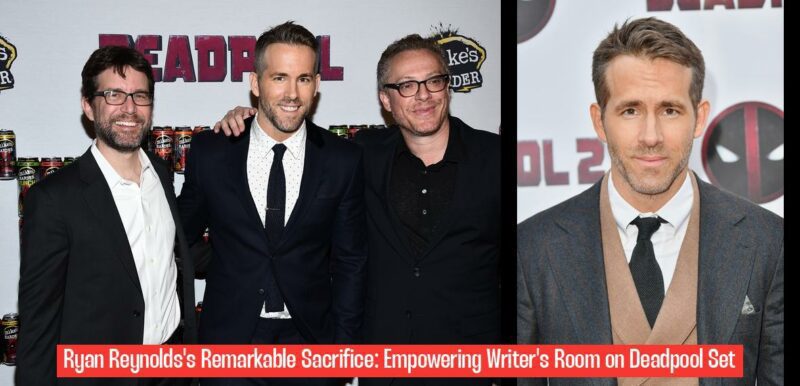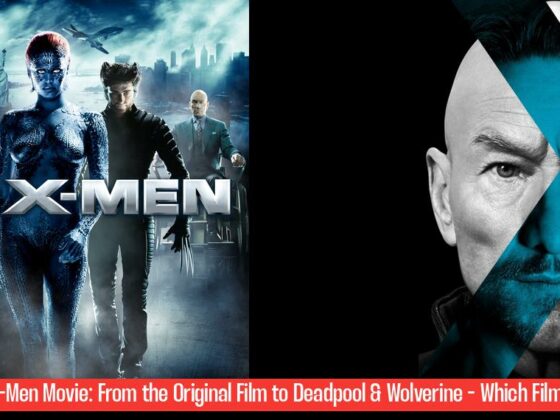Ryan Reynolds’s Unwavering Commitment to “Deadpool”: Sacrificing His Salary to Empower the Writers
Ryan Reynolds, the charismatic actor known for his comedic timing and off-screen wit, has become synonymous with the irreverent superhero “Deadpool.” But behind the fourth-wall-breaking antics and R-rated humor lies a story of unwavering commitment and a genuine belief in the power of collaboration. In a testament to his dedication to the project, Reynolds made a remarkable sacrifice, giving up his initial salary for the first “Deadpool” film to ensure the presence of the writers, Rhett Reese and Paul Wernick, on set. This decision, driven by his trust in the creative team and his vision for the film, speaks volumes about his commitment to storytelling and his willingness to go above and beyond to bring his vision to life.
The story of Ryan Reynolds’s financial sacrifice for the “Deadpool” writers’ room is a compelling tale of artistic dedication and a deep understanding of the collaborative nature of filmmaking. It highlights the importance of empowering creative teams and fostering a collaborative environment where ideas can flourish. Reynolds, driven by his belief in the script and his vision for the film, saw the value in having the writers present on set to ensure the script’s integrity and to adapt to any unforeseen challenges. His willingness to forgo his salary, which is a significant financial commitment, demonstrates his profound respect for the writers’ contribution and his unwavering dedication to the project’s success.
The decision to fund the writers’ room with his own money was not a mere gesture of goodwill but a strategic move that ultimately contributed to the film’s success. Having the writers present on set allowed for immediate adjustments to the script, ensuring that the film remained true to its original vision and that the character of Deadpool remained consistent throughout the film. This collaboration, facilitated by Reynolds’s financial commitment, ensured that the film’s tone, humor, and characterization remained aligned with the writers’ original intent.
Reynolds’s decision to prioritize the writers’ presence on set over his own financial gain underscores his belief in the importance of collaboration in filmmaking. He understood that the writers’ input was crucial to the success of the film, and he was willing to go to great lengths to ensure their involvement. His willingness to sacrifice his own financial interests for the greater good of the film is a testament to his dedication to the art of filmmaking and his unwavering belief in the collaborative process.
The story of Ryan Reynolds’s sacrifice for the “Deadpool” writers’ room is a lesson in collaboration, dedication, and the power of belief in a project. It showcases the importance of empowering creative teams and fostering an environment where ideas can freely flow and evolve, ultimately contributing to the success of the project. Reynolds’s actions serve as an inspiration to aspiring filmmakers and artists, reminding them that sometimes, the most impactful decisions are those that prioritize the collective vision over individual gain.
The Impact of Ryan Reynolds’s Sacrifice on “Deadpool”
Ryan Reynolds’s decision to forego his salary and fund the “Deadpool” writers’ room had a profound impact on the film’s success. The presence of the writers, Rhett Reese and Paul Wernick, on set facilitated a creative synergy that ensured the film’s tone, humor, and characterization remained consistent with the original vision. This collaborative approach was crucial in bringing the irreverent and uniquely meta character of Deadpool to life on screen.
Having the writers present on set allowed for immediate adjustments to the script, ensuring that the film remained true to its original intent and catered to the specific needs of the production. The writers’ presence fostered a dynamic and responsive environment where creative solutions could be generated and implemented in real-time, resulting in a more polished and cohesive final product. This dynamic collaboration, made possible by Reynolds’s financial sacrifice, played a crucial role in translating the irreverent humor and fourth-wall-breaking antics of the comic book character to the big screen.
The impact of Reynolds’s decision extended beyond the creative process. By demonstrating his unwavering commitment to the project and his belief in the writers’ abilities, he fostered a sense of camaraderie and mutual respect among the entire production team. This collaborative spirit, fueled by Reynolds’s actions, played a significant role in creating a positive and productive environment on set, ultimately contributing to the film’s success.
Furthermore, Reynolds’s sacrifice resonated with audiences, highlighting his dedication to the project and his commitment to authenticity. This genuine approach to filmmaking resonated with viewers, enhancing their connection with the film and the characters, particularly with Deadpool, who embodies a similar sense of irreverence and authenticity. This, in turn, contributed to the film’s critical and commercial success, solidifying its place as a cult classic.
Ryan Reynolds’s decision to prioritize the writers’ presence on set over his own financial gain not only contributed to the success of “Deadpool” but also established a precedent for collaborative filmmaking. It demonstrated that financial sacrifices can be made for the sake of artistic integrity and that the creative process benefits from the involvement of all key players, especially the writers who shape the narrative and the characters.
The Importance of Collaborative Storytelling in Filmmaking
Ryan Reynolds’s decision to fund the “Deadpool” writers’ room highlights the crucial role of collaboration in filmmaking. While directors and actors often take center stage, the writers are the unsung heroes who craft the narratives and characters that bring the stories to life. Their ability to translate ideas and emotions into compelling narratives is paramount to the success of any film.
The writers’ room, a space where creative minds converge to shape the story, is an essential element in the filmmaking process. It allows for the brainstorming and refinement of ideas, ensuring that the script is cohesive, engaging, and true to the original vision. By providing a platform for collaboration and dialogue, the writers’ room fosters a dynamic environment where creativity can flourish.
The presence of the writers on set is equally important. It allows for immediate adjustments to the script based on the actors’ performances and the film’s visual aesthetic, ensuring that the story remains consistent and that the characters are portrayed accurately. This dynamic collaboration between writers and filmmakers is essential to bringing stories to life in a way that resonates with audiences.
In the case of “Deadpool,” the writers’ presence on set played a crucial role in shaping the film’s irreverent humor and meta-narrative. They were able to adapt the script in real-time, ensuring that the film remained true to the character’s personality and that the jokes landed effectively. This collaborative process, facilitated by Ryan Reynolds’s financial commitment, resulted in a film that is both entertaining and authentic, solidifying its place as a cult classic.
Ryan Reynolds’s decision to fund the “Deadpool” writers’ room is a testament to the importance of collaborative storytelling in filmmaking. It highlights the crucial role of writers in shaping the narrative, characters, and the overall tone of a film. By empowering the writers and fostering a collaborative environment, filmmakers can create stories that are both engaging and authentic, resonating with audiences and achieving lasting success.
What did Ryan Reynolds do with his salary for the first ‘Deadpool’ film?
Ryan Reynolds gave up his initial salary for the first ‘Deadpool’ film to fund the presence of the writers, Rhett Reese and Paul Wernick, on set.
Why did Ryan Reynolds sacrifice his salary for the writers’ room on the ‘Deadpool’ set?
Ryan Reynolds believed in the creative team and the vision for the film, valuing the writers’ input and ensuring the script’s integrity and adaptation to unforeseen challenges.
How did Ryan Reynolds’s decision to fund the writers’ room contribute to the success of the ‘Deadpool’ film?
Having the writers present on set allowed for immediate adjustments to the script, ensuring the film remained true to its original vision and that the character of Deadpool remained consistent throughout.
What does Ryan Reynolds’s sacrifice for the writers’ room on the ‘Deadpool’ set reveal about his approach to filmmaking?
Ryan Reynolds’s decision to prioritize the writers’ presence over his financial gain underscores his belief in collaboration in filmmaking and his dedication to ensuring the film’s success.



